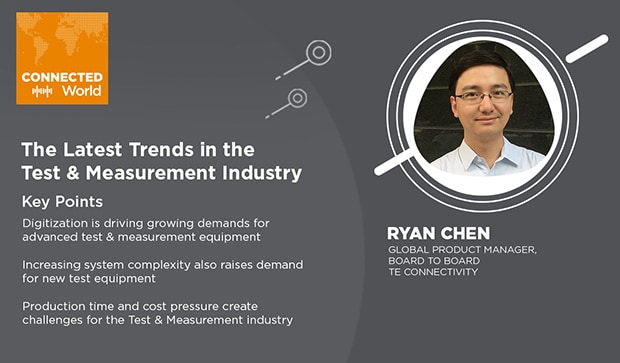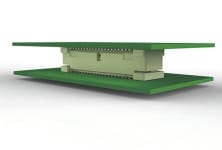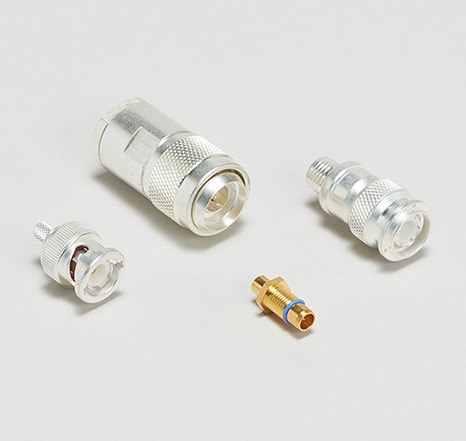Tyler Kern (00:01):
Welcome to CONNECTED World, a podcast for engineers to learn more about the trending topics influencing the connected world and technology turning today's impossible into tomorrow's awesome.
Tyler Kern (00:16):
Hello, and welcome to CONNECTED World, a podcast from TE Connectivity (TE). I'm your host today, Tyler Kern. Now, in previous episodes of the podcast, we've looked at emerging technologies like IoT, 5G, and AI. But today we're diving into a sub industry segment and looking at the trends and challenges for the test and measurement industry. And it's going to be a really exciting conversation because this is a vital industry, and a vital thing that takes place for a lot of the electronics and a lot of the things that have come to be commonplace in our lives.
Tyler Kern (00:44):
And so, joining me today is our subject matter expert. His name is Ryan Chen. He is a global Product Manager for Board to Board at TE Connectivity. Ryan, thank you so much for joining me today.
Ryan Chen (00:54):
Thank you, Tyler.
Tyler Kern (00:55):
Absolutely. Well, Ryan, we're talking about the test and measurement industry today. So, tell me a little bit about how vital the test and measurement industry is to the electronics that have become such a large part of our lives these days.
Ryan Chen (01:08):
As you just said, electronics have become integral part of our lives, such as separate consumer electronics, communication devices, and even the electrical components in vehicles or home appliances. It's difficult to imagine living without electronic devices nowadays. But to ensure each electronic device is effective and functional before going to end users, they must be well-designed and validated by test and measurement equipment. We can almost say that without test and measurement, development and production of any of these electronic devices are impossible.
Tyler Kern (01:49):
Wow, that's pretty incredible because you're absolutely right. It's hard to imagine our lives nowadays without the electronics that have become so ubiquitous throughout all of our lives. Everybody has cell phones these days, everybody has electronics and home electronics and appliances, and things along those lines. And so you're absolutely right. It's hard to imagine our lives without those things.
Tyler Kern (02:09):
So, as we talk about test and measurement, and why it's so important for these electronics that have become so common, what are some of the major trends you're seeing in the test and measurement industry? What stands out to you as major trends taking place right now?
Ryan Chen (02:23):
The test and measurement industry is just like other industries. Digitalization is transforming this field as well. Advances in technologies, such as 5G, industrial internet of things, cloud computing, and more others, are driving this quickly growing trend. For example, the 5G technology plays an important role in virtualization and automation, which we believe are long-term trends in test and measurement market.
Tyler Kern (02:56):
That's really interesting. So, tell me a little about some of the challenges that these trends present for engineers and for people like you. What kinds of challenges are presented by these new trends? Like you said, digitalization, which is affecting everything right now, but how are they affecting engineers who work in the test and measurement industry?
Ryan Chen (03:15):
Because of the digitalization triggered by different advanced technology, as I just mentioned, electronic devices are getting more and more complicated, which means more functions need to be tested. But on the other hand, end customer is asking for shorter and shorter test time in order to save test costs.
Ryan Chen (03:36):
It's very typical in semiconductor industry, which test cost is close to one third of total chip manufacturing costs. So, the first challenge to engineers in test and measurement industry is to design their new test equipment, which can test more and more functions, but with less and less test time.
Ryan Chen (03:58):
Secondly, there are also new test needs caused by digitalization. For example, in automotive industry, more and more electronic items need to be tested and measured along with growing needs of electrical vehicles. Engineers in test and measurement industry will need to design the new equipment, which can work well in the harsh environment of transportation application, where they do not have a test need before.
Ryan Chen (04:29):
And last but not least, test and measurement products are also shifting away from the bulky stationary to mobile handheld and miniaturized equipment. So, engineers in test and measurement industry, we need to design same or even more functions in a smaller and smaller form factor. These are what we see the major challenges for the test and measurement engineers.
Tyler Kern (04:58):
You took me exactly where I wanted to go, because I wanted to talk about that trend and that shift that we're seeing away from bulky and stationary equipment and towards more mobile and handheld and miniature equipment. What advantages does this provide when it comes to test and measurement? Does it allow for you to take test and measurement equipment to another facility, to another place? Does it allow you to be a little more nimble and mobile? Talk me through the advantages provided by that shrinking of the equipment that we're seeing?
Ryan Chen (05:28):
The interesting thing is your question helped me to refresh my memory as the field application engineer in my career. In one case, I had to carry very bulky oscilloscope and take measurements in multiple places at customer site, to find and solve their issue. That was really causing big, big difficulties. And I wish I could get a smaller, lighter oscilloscope.
Ryan Chen (05:57):
From my point of view, the first obvious advantage of miniaturized equipment is that it is more user-friendly. Also in some applications, test and measurement equipment size can be the bottleneck and the miniaturized ones can win against competition. Last but not least, miniaturized test and measurement equipment can also bring total cost advantage to end customers.
Tyler Kern (06:24):
That's a really interesting and good point, that there's that cost advantage there. Absolutely. So, one of the things that we're seeing a lot of is virtualization and automation, and those things changing the test and measurement industry. So, talk me through some of the changes that you're seeing, that are being brought about by virtualization and automation in this industry.
Ryan Chen (06:45):
Actually, most companies are always looking for ways to lower capital and operational expenses, while at the same time, use new and advanced technology to become more dynamic in manufacturing or networking capacity, autonomous functionality, and more. And 5G is often geared to deliver greater capacity to transmit and receive large amounts of data, improve responsiveness and increase connectivity between multiple devices and applications.
Ryan Chen (07:20):
As more functionality moves through the cloud and networks become virtualized, 5G technology can enable automated processing of a huge volume of data from multiple sources across a complex distributed architecture. This automation and virtualization can allow manufacturers and data centers to scale up services and incorporate higher bandwidth technologies, such as artificial intelligence and machine learning.
Ryan Chen (07:51):
This technology is also becoming more critical for testing and measuring wireless devices and products that incorporate virtualization and automation. Because the original equipment manufacturers and network operators often need to test and measure performance in environments and conditions where the devices and products will be used. As 5G technology evolves to greater meter wave frequencies, over the air measurements become critical for design delegation. That's what we see: the virtualization and automation change enabled by 5G to test and measurement industry.
Tyler Kern (08:34):
Absolutely. So, Ryan, we've mentioned a couple of different industries throughout this time. You mentioned automotive and we've also talked a bit about semiconductor and things like that. So, what industries are experiencing growth right now, and how is that driving the need for more test and measurement innovations?
Ryan Chen (08:51):
The overall test and measurement equipment market presents a huge opportunity for growth in multiple industries. And I would like to select two applications we just mentioned earlier, which are significantly driving high growth in this market.
Ryan Chen (09:10):
First is semiconductor industry. We take SOC, which means system on a chip in smart phone as an example. How many more features and functions are in today's smartphones, comparing with the ones 5 to 10 years ago? With the increase of functionality, enabled by SOC, size of smartphones is close or even more compact. So, the complexity to test a SOC chip is rapidly increasing, which brings challenges and more opportunities to the test and measurement market growth. Moreover, the test and measurement players are pushed by end customers to keep innovating their test equipment platforms to meet higher and higher time-to-market pressures in semiconductor industry.
Ryan Chen (10:02):
And second is the transportation industry. As we all know, cars are becoming increasingly more electrified and connected. Contents to be tested and the measurement in our car is expected to have very high growth rate. Electronic contents in a car will include this average of about 30%. The contribution is managed from more electrical car penetration, more ADAS coverage. ADAS means advanced driver assistance systems, and more sensors are required. Automotive engineers may need to measure more signals with higher complexity at the same time. They have to capture and analyze as much data as possible, and as quickly as possible. The need for high speed and more bandwidth may keep growing, as well as for data analytics. By the way, taking this chance, at TE, we have broader product offerings where this kind of high-performance high bandwidth systems ... we transfer high speed data rate, such as our STRADA Whisper backplane connectors.
Tyler Kern (11:14):
Absolutely. That's a great thing to bring up, here at the very end. And you mentioned a couple of times that what's taking place also allows for more efficiency in the process and it's more customer friendly. And so, also, a part of everything that's going on is reducing costs for clients and for customers, which is an important thing, right? You want to be able to make sure that everything is tested and measured correctly and validate everything, but also at a cost that is reduced for the client, right?
Ryan Chen (11:45):
Yeah.
Tyler Kern (11:48):
Absolutely. Absolutely. Well, Ryan Chen, global Product Manager for Board to Board at TE Connectivity. Ryan, thank you so much for joining me today and talking about the test and measurement industry, and some of the other industries that are pushing growth in this area and some of the big trends and challenges you're seeing right now. Ryan, thank you so much for joining me today.
Ryan Chen (12:03):
Yes, thank you, Tyler.
Tyler Kern (12:06):
Absolutely. And everyone, thank you for joining us for this episode of CONNECTED World, a podcast from TE Connectivity. We appreciate you being along with us today, very, very much. Of course, we do have previous episodes of the podcast. So if you missed episodes on IoT or 5G or AI, or any of the other podcasts that we've recorded already in this series, make sure to go back and check those out and stay up to date with the latest going on in the Connected World, as we're experiencing a time of incredible innovation. And so you want to check out those episodes from other subject matter experts as well.
Tyler Kern (12:34):
And while you're there, make sure you subscribe to the podcast to stay up to date with the latest. You can do that on Apple podcast or Spotify. And, of course, we'll be back soon with more episodes of the podcast, but until then, I've been your host today, Tyler Kern. Thanks so much for listening.
TE, TE Connectivity TE connectivity (logo), STRADA, and STRADA Whisper are trademarks owned or licensed by the TE Connectivity plc family of companies. All other logos, products and/or company names referred to herein might be trademarks of their respective owners.













 e
e
 e
e
 e
e
 e
e
445x470.jpg/jcr:content/renditions/compact-promo-grid.jpg) e
e


 e
e


 e
e


 e
e
 e
e

 e
e

 e
e
 e
e
 e
e
 e
e
 e
e
 e
e
 e
e
 e
e
 e
e
 e
e
 e
e
 e
e
 e
e



